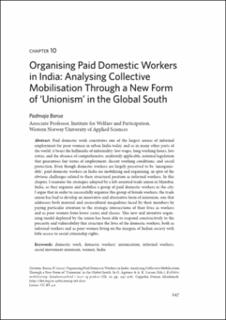| dc.description.abstract | Paid domestic work constitutes one of the largest arenas of informal employment for poor women in urban India today, and as in many other parts of the world, it bears the hallmarks of informality: low wages, long working hours, low status, and the absence of comprehensive, uniformly applicable, national legislation that guarantees fair terms of employment, decent working conditions, and social protection. Even though domestic workers are largely perceived to be ‘unorganisable’, paid domestic workers in India are mobilizing and organizing, in spite of the obvious challenges related to their structural position as informal workers. In this chapter, I examine the strategies adopted by a left-oriented trade union in Mumbai, India, as they organize and mobilise a group of paid domestic workers in the city. I argue that in order to successfully organize this group of female workers, the trade union has had to develop an innovative and alternative form of unionism, one that addresses both material and sociocultural inequalities faced by their members by paying particular attention to the strategic intersections of their lives as workers and as poor women from lower castes and classes. This new and inventive organising model deployed by the union has been able to respond constructively to the precarity and vulnerability that structure the lives of the domestic workers, both as informal workers and as poor women living on the margins of Indian society with little access to social citizenship rights. | en_US |

